The sole recourse against an arbitral award is by application for setting aside. TIAL provides an exhaustive list of grounds on which an award may be set aside. These are divided into two categories; ones that are to be proved by the parties, and others which a court may consider of its own initiative.
Arbitral Award
Under The Turkish International Arbitration Law of 2001 ("TIAL"), unless otherwise agreed by the parties, an arbitral award is to be rendered within one year from the date on which the appointment of the arbitrator took place where there is a sole arbitrator, or on the date on which the minutes of the first meeting are issued where there is an arbitral tribunal. Parties may agree to prolong this time limit before the expiration of the term. However, if the latter fails to come to an agreement, the competent court may order the extension of the term upon the request of either party. If the court rejects such request, the arbitration process terminates upon the expiration of the aforementioned period. The court's decision in this respect is final. Rendering an award after the expiration of the term fixed by the parties, TIAL or the court constitutes a ground for setting aside the arbitration award.
Unless otherwise agreed by the parties, TIAL permits rendering of partial awards.
Pursuant to Article 14 of TIAL, an arbitral award shall contain the names, surnames, titles and addresses of the parties and, if any, of their representatives; legal grounds and reasons on which the award is based, amount of compensation, if any is claimed; place of arbitration; date of the award; name(s), surname(s), signature(s) and dissent(s) of the arbitrator(s) and finally, a statement indicating that a set-aside procedure may be initiated against the award.
An arbitral award must address the costs of the arbitration which includes arbitrators' fees, their travel and other relevant expenses, expert witness fees, costs for on-site visits, costs incurred by the witnesses to the extent approved by the arbitrators, attorney fees of the successful party estimated in accordance with the minimum attorney's fee tariff, court fees which are to be paid in relation to the applications made under TIAL, and expenses incurred for the notifications relating to the arbitration. Unless otherwise agreed by the parties, costs are borne by the losing party. Where both parties are found to be partially right, arbitrators shall allocate the costs in proportion to each party's success.
Challenge of the Arbitral Award
Within 30 days from the receipt of the award, either party, with a notice to the other party, may file an application before the arbitrator(s) to correct any material calculation or clerical errors as well as mistakes of similar nature; or to interpret a part or whole of the award. If the arbitrator(s) find that, upon seeking the other party's opinion, the request is justifiable, the tribunal shall make the necessary correction or give interpretation within 30 days from the filing of such request. Arbitrator(s) may also make corrections in relation to any material errors on their own motion within 30 days from the date of the award.
Furthermore, within 30 days from the receipt of the award, a party may request the arbitrator(s) to issue an additional award in relation to claims which were propounded during the arbitration proceedings but omitted from the award. If such a request is found to be justified, arbitrators are to render an additional award within 60 days from the date of such request. The decision on the correction, interpretation and the additional award is notified to the parties and forms a part of the award.
Under TIAL, parties have a right to request setting aside of an arbitral award within 30 days from the receipt of the award. That said, the time starts to run from the date on which a correction, interpretation or additional award is notified to the parties if such a request has been raised.
The sole recourse against an arbitral award is by application for setting aside. TIAL provides an exhaustive list of grounds on which an award may be set aside. These are divided into two categories; ones that are to be proved by the parties, and others which a court may consider of its own initiative. Accordingly, an award may be set aside if a party proves that: parties lacked capacity to conclude an arbitration agreement; the arbitration agreement was invalid under the law to which the parties have subjected it, failing any indication thereon, under Turkish law; the arbitral tribunal was constituted irregularly; the arbitral tribunal wrongly accepted or declined jurisdiction; there exist ultra, infra or extra petita circumstances; the award was not rendered in time; or principles of due process or equal treatment of the parties were violated. On the other hand, the court examines, on its own initiative, whether or not the subject matter of the arbitration was arbitrable under Turkish law and that the award is in compliance with public policy. As seen, none of the grounds relates to the substance of the award; except for the public policy assessment. In a recent decision dated 30 September 2015, the Supreme Court Assembly of Civil Chambers, whose decisions are binding unlike Supreme Court decisions, delivered that even though the public policy examination requires partial review of the award on its merits, such review shall not go beyond examining whether or not there has been a public policy violation, and therefore shall not constitute a review of the award on its merits in the technical sense.
Parties may, partially or wholly, waive their right to apply to have the award set aside through a declaration within the arbitration clause or a written agreement concluded after the signing of the arbitration agreement, provided that neither party has its domicile or habitual residence in Turkey. Decisions of the first instance court on the set-aside application are open for appeal before the Supreme Court. That said, unless the competent court decides otherwise, the set-aside procedure is finalised without holding any hearings; as well as given priority and handled expeditiously.
This article first appeared in the second Edition of Global Legal Insights–International Arbitration; published by Global Legal Group Ltd, London.
The content of this article is intended to provide a general guide to the subject matter. Specialist advice should be sought about your specific circumstances.



